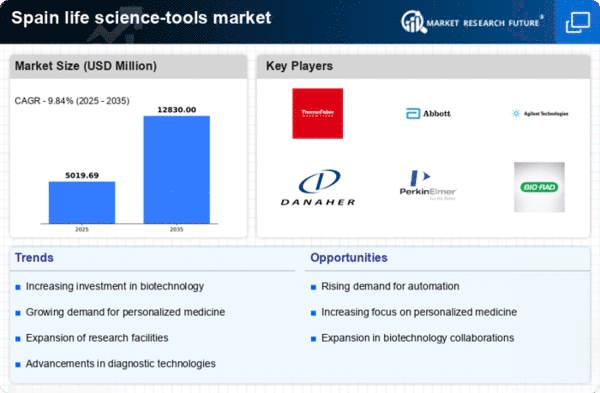Regulatory Support for Innovation
Regulatory frameworks in Spain are evolving to support innovation within the life science-tools market. The Spanish Medicines Agency is actively working to streamline approval processes for new tools and technologies, which may reduce time-to-market for innovative products. This regulatory support is crucial for fostering a conducive environment for research and development. Additionally, the agency is promoting initiatives that encourage compliance with international standards, which could enhance the global competitiveness of Spanish products. As a result, the life science-tools market is likely to see an influx of new entrants and innovations, contributing to its overall growth.
Rising Investment in Biotechnology
The life science-tools market in Spain is experiencing a notable increase in investment, particularly in biotechnology. This surge is driven by both public and private sectors, with funding reaching approximately €1.5 billion in 2025. Such financial backing is likely to enhance research capabilities and foster innovation in the development of new tools and technologies. The Spanish government has also initiated various programs to support biotech startups, which may further stimulate growth in the life science-tools market. As a result, the market is expected to expand at a CAGR of around 8% over the next five years, indicating a robust environment for technological advancements and product development.
Growing Demand for Diagnostic Tools
There is a significant increase in the demand for diagnostic tools within the life science-tools market in Spain. This trend is largely attributed to the rising prevalence of chronic diseases and the need for early detection and monitoring. The market for diagnostic tools is projected to grow by approximately 10% annually, reflecting the urgent need for effective solutions. Furthermore, advancements in molecular diagnostics and point-of-care testing are likely to drive this growth. As healthcare providers seek to improve patient outcomes, the life science-tools market is positioned to benefit from this heightened focus on diagnostics, leading to increased sales and innovation.
Collaboration Between Academia and Industry
The life science-tools market in Spain is witnessing a growing trend of collaboration between academic institutions and industry players. This synergy is fostering innovation and accelerating the development of new tools and technologies. Universities and research centers are increasingly partnering with biotech companies to translate research findings into practical applications. Such collaborations are expected to enhance the competitiveness of the life science-tools market, as they facilitate knowledge transfer and resource sharing. The Spanish government has also recognized the importance of these partnerships, providing funding and support to encourage joint ventures, which may further strengthen the market landscape.
Increased Focus on Research and Development
There is an increasing emphasis on research and development (R&D) within the life science-tools market in Spain. Companies are allocating more resources to R&D activities, driven by the need to innovate and stay competitive. In 2025, R&D spending in the life science sector is estimated to reach €800 million, reflecting a commitment to advancing scientific knowledge and technology. This focus on R&D is likely to lead to the development of cutting-edge tools and solutions that address emerging healthcare challenges. As a result, the life science-tools market is expected to benefit from enhanced product offerings and improved market positioning.
















